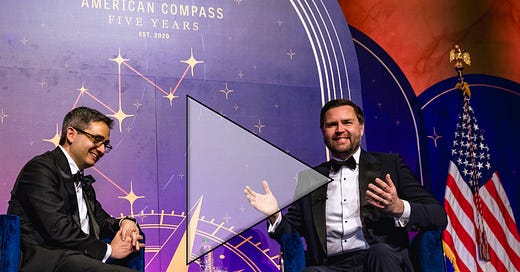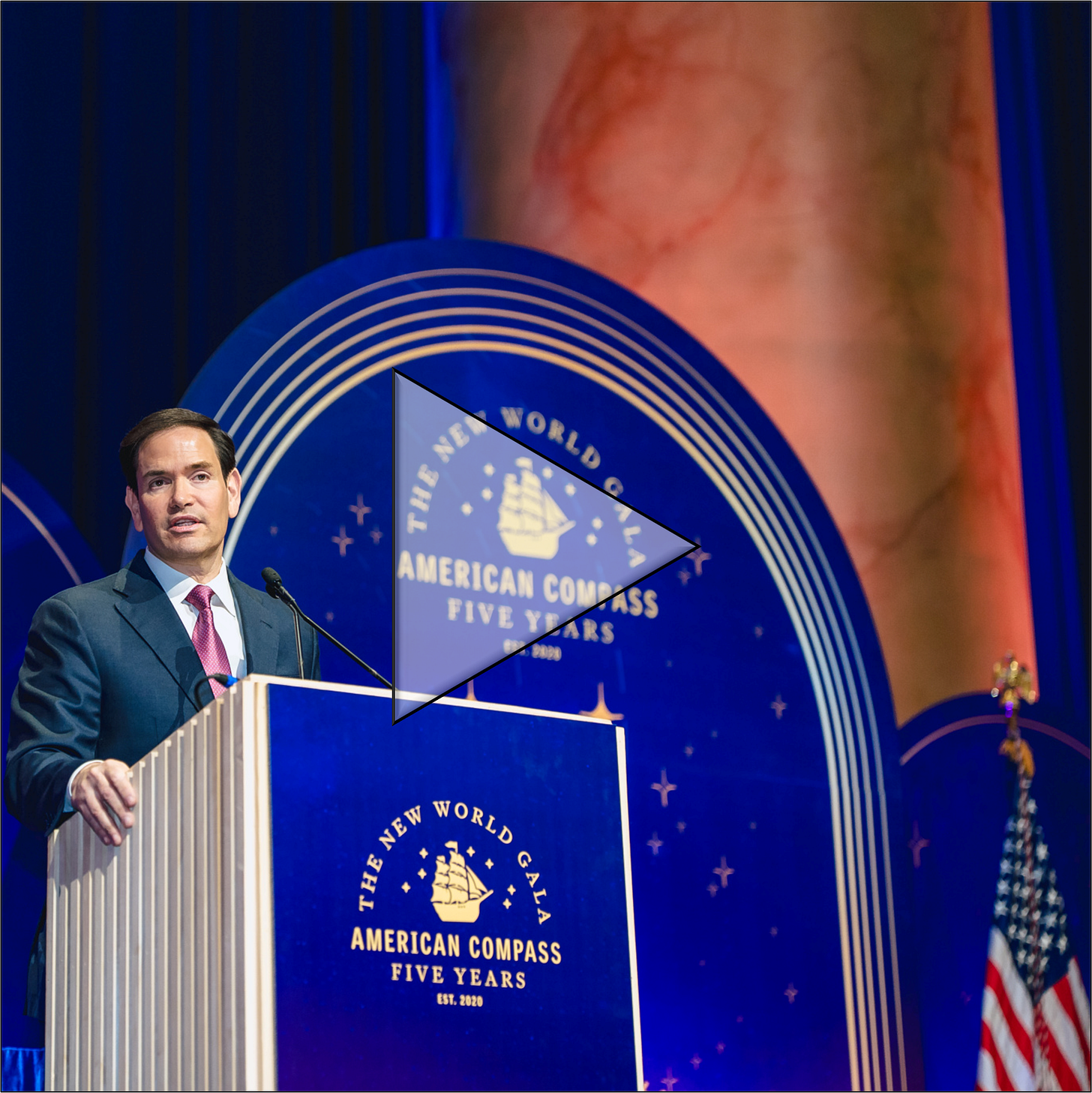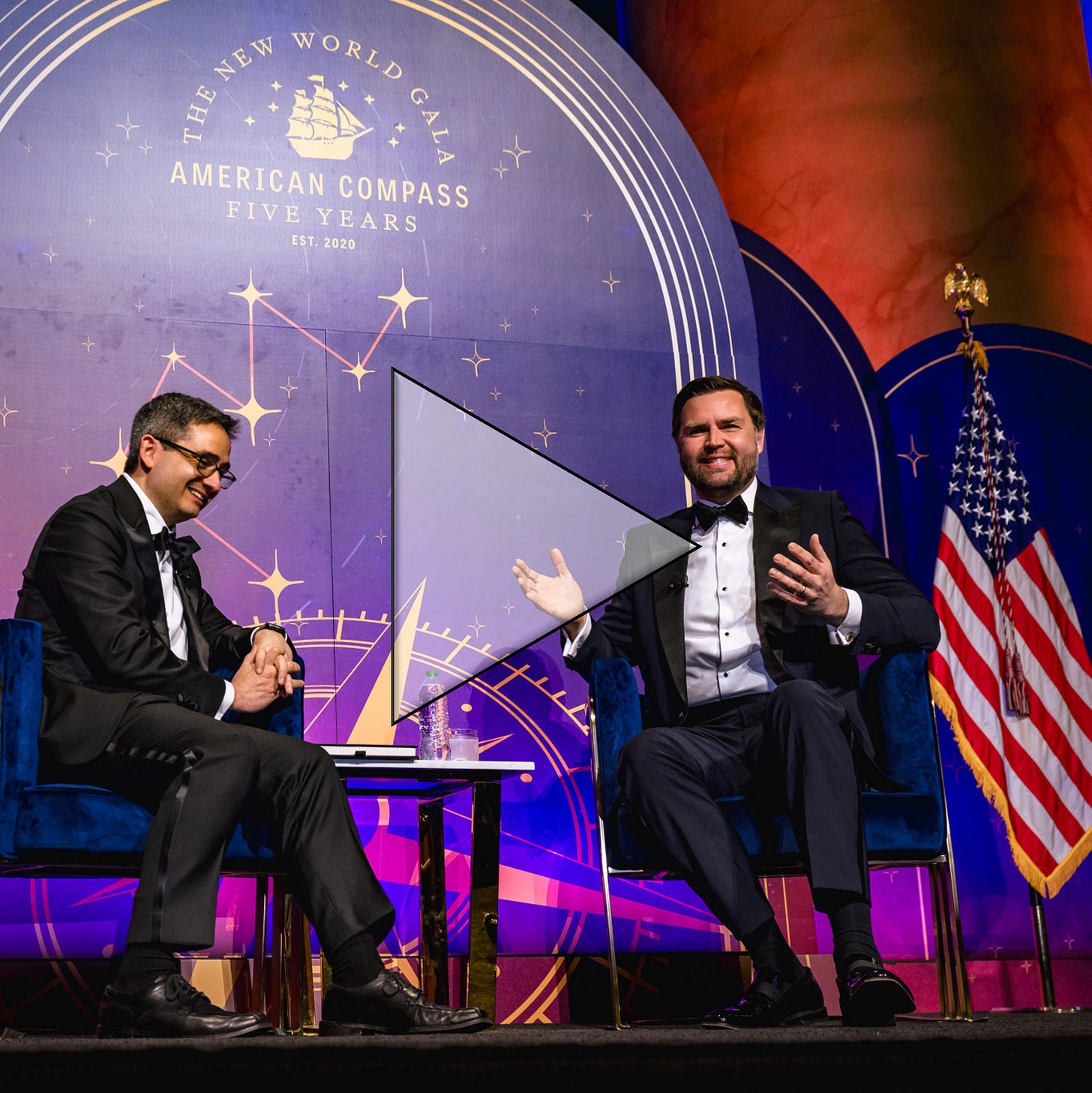“Vice President JD Vance and Secretary of State Marco Rubio offered a preview of a post-Trump Republican Party on Tuesday,” reports Politico, “at a gathering of many of those who in the coming years will be responsible for running it.”
That gathering, a gala celebrating the fifth anniversary of “American Compass, the institutional home of conservative economic populism in Washington” was “broadly understood to represent a victory lap of sorts, marking the ascendancy of [our] brand of economic populism” (also per Politico).
Secretary Rubio’s remarks and my Q&A with Vice President Vance are worth watching in full:
You can also listen to my conversation with Vance on the American Compass Podcast.
One other housekeeping note: fewer of you than usual opened Monday’s email, titled “The Torah Speaks of Four Sons.” I guess you’re not here for Torah talk—fair enough. But it wasn’t about the Torah! It was about economic policy and my ongoing feud with the Wall Street Journal over whether economics is a science. You can tell it’s not going great for the Journal because their latest entry demurs, “Is economics a science? The question isn’t helpful.” Mmhmm.
As I explain, “Debates over the efficacy of economics as a discipline, and the role it should play in public policy, tend to bring forth defenders of the status quo who themselves fit four archetypes—call them the Simple Son, the Unwise Son, the Son Who Does Not Know What’s Going On, and John Podhoretz.” Go read the whole thing.
As for what else has been going on this week, your one thing to read is this terrific Commonplace profile of Third Circuit judge Paul Matey, Matey for SCOTUS, by Harvard Law student Benjamin Holbrook and recent graduate Andrew Hayes. (And yes, the editors responsible for not titling the piece “Ahoy, Matey!” have been discharged. We don’t tolerate such avoidance of appropriate nautical themes.)
Holbrook and Hayes lament the stagnation of the conservative legal movement and the decline of the once vital campus chapters of the Federalist Society into “a big tent of law students and faculty who continue to fight the battles of 1985… a club of neutral careerists with one or two marginal disagreements with the dominant campus left.” They see “young conservative lawyers…tired of fighting to work for ‘conservative’ mentors only to find themselves surrounded by colleagues who share none of their first principles or moral groundings save for a general commitment to the text as a starting place.”
Enter Judge Matey, a product of Seton Hall Law School who served as an Assistant U.S. Attorney in New Jersey, legal counsel to Governor Chris Christie, and general counsel secretary of the University Hospital in Newark before his appointment to the Third Circuit in 2019.
This commitment of Judge Matey to his roots typifies a modern legal conservatism that has steadily rejected careerism and ambition for its own sake in favor of a commitment to the moral fabric of communities. If the lukewarm proceduralism of Chief Justice Roberts or Justices Gorsuch and Kavanaugh has taught us anything, it’s that warriors don’t live in McLean and Bethesda. The new heroes of the conservative movement didn’t chase Olympus for personal profit; they went home to handle the hard work of making their hometowns better.
As an illustration of Matey’s new mode of conservative jurisprudence, which advocates “a return to classical legal thought grounded in historical continuity, moral reasoning, and judicial humility before tradition,” Holbrook and Hayes point to his concurrence in Range v. Attorney General, where he surveyed the 18th-century natural law literature on the right to bear arms because, he said, “I follow the well-established practice of consulting classical authorities discussing natural law to inform the determination of written rights.”
We focus mostly on politics and economics here at Understanding America, but legal thinking has undergone a similar ebb and flow of dramatic innovation in the early 1980s that took American government by storm, became orthodoxy and then dogma, and now appears ripe for renewal. The profile is the best articulation I’ve seen of the movement underway, told through the story of one of its leaders.
Bonus tweets: Professors Patrick Deneen and Jack Goldsmith were highlighting these dynamics as well this past week. Deneen observed:
Here’s the skinny: having spoken in recent years at a number of prestigious law schools (at the invitation of students, never faculty), the current younger generation of law students running the Fed Soc chapters at the Ivies shares the President’s skepticism re: the Boomer generation of Fed Soc leadership. They have seen the pallid results of defensive crouch positivist legal philosophy, and crave a bolder and substantive approach to jurisprudence and constitutional law oriented to the common good and informed by natural law.
Goldsmith concurred: “This is an accurate description of trends I see among conservative students at a number of top law schools.”
WHAT ELSE SHOULD YOU BE READING
It’s Time for the Second Draft of Globalization | Larry Fink, Financial Times
BlackRock chairman and CEO Larry Fink delivers a dramatic mea culpa from Wall Street in the pink pages of the FT, describing the era since the Cold War’s end as “globalism without guardrails,” from which “the benefits weren’t evenly shared.” Markets “primarily served countries’ wealthiest citizens and largest institutions,” he says, and “unchecked, financialisation can fuel inequality. That was the first draft of globalisation: enormous wealth, unevenly distributed, with little thought for who benefited — or where.”
In Fink’s conception of a modified globalization, “We should still want capital to move freely towards opportunity — that’s what makes markets efficient. But that doesn’t mean countries can’t steer more of that capital home.” The vision he presents strikes me as overly dependent on, as he puts it, “helping more people become investors.” But I suppose it would be a bit much to expect that BlackRock would renounce its business model altogether.
This sort of self-reflection is an important stepping stone toward policy reform. It also helps underscore how badly the Old Right, still insisting that nothing is even wrong, has lost touch, and relevance.
Will AI Replace Your Job? Perhaps Not in the Next Decade | Mark A. Wynne & Lillian Derr, Federal Reserve Bank of Dallas
I love this study so much. In the face of headline-grabbing claims that AI is set to eliminate entire classes of jobs, Wynne & Derr look back to the last time, a decade ago, when headline-grabbing claims warned that computerization was set to eliminate entire classes of jobs. Then, in 2013, the iconic paper was Frey & Osborne’s University of Oxford study that warned 47 percent of U.S. employment was at risk. I’ve often enjoyed mocking this paper, which made absurd assertions—for instance, that school bus driver is among the most automatable jobs, because, sure, parents would totally go for locking 30 kids in a big metal box for half an hour without adult supervision.
The school-bus bit isn’t a pedantic point. It speaks to a fundamental failure of the technologists, economists, and other researchers who make sweeping claims about the automation of various jobs while obviously having no understanding of the actual nature of the jobs, the skills and tasks required, and the edge cases that occupy the most time. “Your job will be done by a computer” is usually just shorthand for “I know nothing about what you do and lack the appropriate respect for it.”
So Wynne & Derr checked in on the Frey & Osborne predictions and find two notable things: First, no correlation with the actual labor market shifts that have subsequently occurred. Second, no correlation with the set of jobs the technologists and economists are now predicting will surely be automatable. Maybe they don’t know that much about the direction of technology, either.
AND AT COMMONPLACE
Along with the terrific Judge Matey profile, be sure to check out:
Make American Manufacturing Great Again by Fred Bauer. As reciprocal trade deals progress, the Trump administration should invest in building here at home.
The One Immigration Number That Matters by Chris Chmielenski. In four months, the Trump administration has locked down the border—but it can’t stop there.
On the American Compass Podcast this week, in addition to the bonus episode with Vice President Vance, I interviewed Sam Tanenhaus, author of the magisterial new Buckley: The Life and the Revolution That Changed America. (He said it was OK to call it magisterial!) We discussed Buckley’s life, his role in shaping the conservative coalition of the late 20th century, and the lessons applicable to the reshaping underway today.
As always, visit commonplace.org, follow us on X @commonplc, and subscribe for regular articles directly in your inbox.
Enjoy the weekend!







Richard! so true! Fink is a globalist Ford Foundation creature. And sorry Oren, but he will not change, he has gotten too much power, and too much money from this system. These old neo con globalist, libertarian, "Free Trade" yea right free trade whatever types will have to die out for there to be true change. They cannot change. Around 2030 these old types will be gone then new systems that benefit the USA can emerge.
Fink and all the rest are starting to do a "Jake Tapper" go chameleon and change their colors. These guys are sneaky fast and very manipulative. Why they do so well. Scary people to me.
I just worry that in the last 25 years especially our educational system has been so damaged and warped we have not produced the leaders for tomorrow that will be needed for this fight. I believe leaders are made not born. Leaders are products of a society and culture. They are made.
Your show with Rubio and Vance gave me hope. Not something I feel much these days when I hear celebrities and politicians talk. They were great and you did a great job with them. Thank you. Keep up the great work there.
Your republican party I will join!
Don't trust Fink. Trust but verify